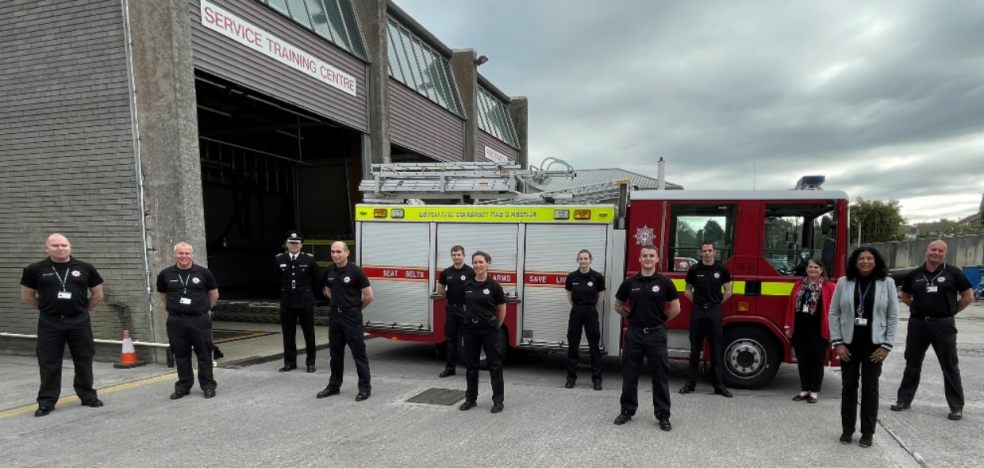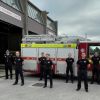
Devon and Somerset on-call firefighters make history
Six on-call firefighters from Devon and Somerset Fire and Rescue Service made history this week (12 April) when they completed the End Point Assessment of the operational firefighter apprenticeship. This is a national first – it is usually only wholetime firefighters who take this apprenticeship.
Devon and Somerset Fire and Rescue Service is breaking boundaries in offering the same training and development opportunities for both on-call and wholetime firefighters.
The first six firefighters to complete the assessments are:
- Owen Cheffey, based at Bridgwater Fire Station
- Lilli Ibbotson, based at Bridgwater Fire Station
- Laura Hutchings from Newton Abbot Fire Station
- James Lavis from Newton Abbot Fire Station
- Thomas Mole from Middlemoor Fire Station (Exeter)
- Dan McBride from Torquay Fire Station
Joe Hassell, Deputy Chief Fire Officer at Devon and Somerset Fire and Rescue Service, and national on-call lead for the National Fire Chiefs Council (NFCC), said: “This is a historic and proud moment for us as a Service. I know how hard our on-call staff work, but for these six apprentices to put so much time into their professional qualification shows just how dedicated they are to protecting their communities.
“Our academy staff worked hard to influence the Education and Skills Funding Agency (ESFA) to accept adaptations to the apprenticeship to enable our on-call firefighters to complete the apprenticeship. In my role as national on-call lead, this is the sort of innovation I love to see and I am sure other Fire and Rescue Services will be learning from our success.
“Once we review this pilot if it’s as successful as we want it to be, we will look to roll out further across all on-call staff.”
This level of apprenticeship requires 1,560 hours of paid firefighter work, and is typically completed over an 18-24 month period. Previously, on-call firefighters could not undertake the apprenticeship because they may not be able to complete the necessary hours working as a firefighter – it was dependent on how busy their fire station is and how many incidents they are called to attend.
Working with The Education Skills Funding Agency, and the National Fire Chiefs Council, Devon and Somerset Fire and Rescue Service were able to influence a change in policy, and the Department for Education approved the use of apprenticeships for training on-call firefighters.
Mark Palmer, Quality and Accreditation Manager at Devon and Somerset Fire and Rescue Service has been instrumental in piloting the first group of on-call apprentices. He said: “This is a really exciting time not only for these six apprentices, but the on-call service nationally. I’m delighted that our on-call firefighters have had the opportunity to access the operational firefighter apprenticeship and achieve this national standard.”
The End Point Assessment took place at Bridgwater & Taunton College and was delivered by SFJ Awards independent assessors. The assessment consisted of three parts: a knowledge test, a practical observation, and a professional discussion.
Devon and Somerset Fire and Rescue Service has been working in partnership with Bridgwater & Taunton College since 2018. The college supports the Service in implementing the training plan and preparation of the apprentices to the point of assessment. The college may also deliver functional skills in English and maths.
Amanda Charlton, Curriculum Manager for Protective Services work-based learning at Bridgwater & Taunton College said: “These firefighters have been managing their on-call duties, alongside other work, home commitments and their apprenticeship training. They have all shown incredible commitment and dedication to their programme of learning and we wish them every possible success in their upcoming end point assessments.”
Apprentice Owen Cheffey, said: “Working within the fire service has always been a dream career for me. When I passed all the tests and became an on-call firefighter, I was thrilled. Shortly after that I was offered a place on the apprenticeship, which naturally I took straight away as I wanted as much exposure to the job as possible.
"The work involved with the apprenticeship can be challenging at times, however the amount of training and studying that I have completed to meet the different aspects of criteria has made me more confident when stepping onto the fire ground. I will take every learning experience with me in my career and constantly develop myself to become a better firefighter. I believe that the apprenticeship has given me a very good base to build myself from and definitely set the standards high."
Apprentice Laura Hutchings said: “The apprenticeship has enabled me develop my operational skills to a great standard and build my confidence. I am sure it will support me with my career moving forward.”














